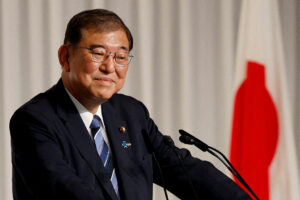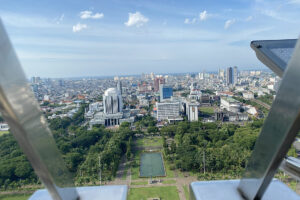KUALA LUMPUR – Indonesia’s elections next year are likely to spur deforestation as politicians seek campaign funds from businesses in return for easier access to rich natural resources, environmentalists say.
The Southeast Asian nation, the world’s third-largest democracy, will hold a general election on Feb. 14, with regional polls planned for later in 2024.
“Next year’s election is pivotal for Indonesia to determine the fate of the richest and most biodiverse forests in the world,” said Annisa Rahmawati, a board member at Indonesian conservation group Satya Bumi.
She and other experts fear the soaring costs of campaigns – and little oversight of spending – will undercut rainforest protection.
Ward Berenschot, a professor in comparative political anthropology at the University of Amsterdam, said election campaigns in Indonesia are so expensive that politicians from local to national levels have developed “very close ties” with natural resource companies to help finance their ambitions.
“Measures to protect forests have been under pressure because helping campaign donors, or sometimes even family companies, to sidestep or circumvent (them) has been a way to fund campaigns,” said Berenschot, who has researched the issue.
Nature-rich Indonesia has a third of the world’s rainforests but large areas have been cleared in recent decades due to the expansion of crops like palm oil, as well as mining, pulp and paper expansion, and urbanisation.
Trees suck up planet-warming carbon dioxide to grow, but release it when they rot or are burned. Land use change, mainly deforestation, accounts for about 10-20% of global greenhouse gas emissions.
Indonesia’s deforestation rates have slowed in recent years – helped by stricter policies and forest fire controls – but the Southeast Asian nation was still ranked fourth globally for primary tropical forest loss in 2022 by the nonprofit World Resources Institute.
VOTE-BUYING WIDESPREAD DESPITE CRACKDOWNS
Vote-buying has become common in Indonesia’s national elections over the last 25 years, despite crackdowns by the state corruption watchdog. A 2017 poll estimated that a third of voters are impacted by the practice.
After the presidential election in 2019, runner-up Prabowo Subianto – now the defence minister – initially refused to accept the result, with his party citing fraud that included vote-buying. The Constitutional Court dismissed his objections.
With current President Joko Widodo’s second and final term due to end, candidates for next year’s presidential elections include Prabowo, Central Java governor Ganjar Pranowo and former Jakarta governor Anies Baswedan.
Key voter issues include jobs, the economy, health care access, the cost of living, corruption, pollution and climate change.
Conservationists will be hopeful that Widodo’s successor will build on the results his government has achieved in tackling deforestation and restoring mangroves, including making permanent a moratorium on primary forest clearing.
With a growing population of 270 million, Indonesia’s elections are becoming increasingly expensive – leading to forests being used as an “ATM” cash dispenser by many parties seeking campaign finance, said Rahmawati of Satya Bumi.
This practice should stop “because it humiliates and ruins our progress in democracy … destroying our environment and our economy”, she said, adding that electoral candidates should be forced to publish the source of all their campaign funds.
Marcus Colchester, a senior policy advisor at the UK-based Forest Peoples Programme, said Indonesian politicians are often unwilling to regulate corporations because they depend on them for funds.
Those links often harm local and Indigenous peoples, whose land is sometimes granted to companies without their consent, he added.
“(The) double whammy – impunity and graft – becomes the main obstacle to social justice and environmental prudence,” Colchester said.
“Accountability and democracy are undermined, and natural resource governance made impossible.”
BIG BUSINESS RULES IN INDONESIAN POLITICS
Berenschot at the University of Amsterdam said changes to legislation have often favoured big business. A 2023 decree seeking to boost jobs and investment, for instance, was criticised by green groups as weakening environmental protections.
“That close connection between business and politics also enabled certain policies and laws … to be adopted, which risks accelerating deforestation,” Berenschot said.
In addition, Indonesia’s major political parties are often led by wealthy individuals and business owners, who may prioritise the economy over issues like the environment.
Politicians’ campaign spending is hard to track and often lacks transparency.
Ten years ago, an expert survey among 500 local political observers found that a successful candidate for district head spent on average $1.5 million on campaigning, while an elected governor spent about $10 million, he added.
“For an economy where the minimum wage is about $300 per month, these are very big amounts of money,” Berenschot noted.
AFTER AN ELECTION, FORESTS FACE PRESSURE
In election years, deforestation rates have slowed but then usually increased the following year, said Toerris Jaeger, director of the Oslo-based NGO Rainforest Foundation Norway.
“In the past we have seen that before the end of a government period, licences and permits in the forest and peatland area were being given to companies that provided or backed up campaign funding or that were tied into political parties that are running in the election,” said Jaeger.
Failure to tackle the link between elections and deforestation will make it harder for Indonesia to reach its own climate goals related to reducing emissions from deforestation – and lead to more frequent natural disasters, he added.
“Transparency and accountability are necessary to break the link between deforestation and funding for political campaigns,” Jaeger said. — Reuters























